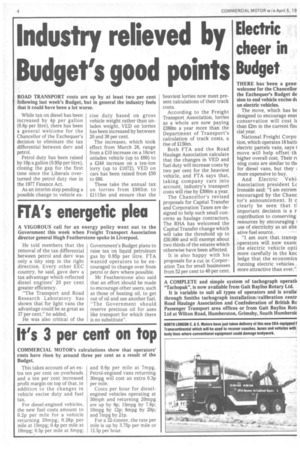Industry relieved by Budget's good points
Page 6

If you've noticed an error in this article please click here to report it so we can fix it.
ROAD TRANSPORT costs are up by at least two per cent following last week's Budget, but in general the industry feels that it could have been a lot worse.
While tax on diesel has been increased by 4p per gallon (0.8p per litre), there has been a general welcome for the Chancellor of the Exchequer's decision to eliminate the tax differential between dery and petrol.
Petrol duty has been raised by 10p a gallon (0.95p per litre), closing the gap for the first time since the Liberals overturned the petrol duty rise in the 1977 Finance Act.
As an interim step pending a possible change to vehicle ex cise duty based on gross vehicle weight rather than unladen weight, VED on lorries has been increased by between 20 and 30 per cent.
The increases, which took effect from March 26, range from a £10 increase on a 16cwt unladen vehicle (up to £60) to a £248 increase on a ten-ton lorry (up to £1072). VED on cars has been raised from £50 to £60.
These take the annual tax on lorries from £965m to £1115m and ensure that the heaviest lorries now meet present calculations of their track costs.
According to the Freight Transport Association, lorries as a whole are now paying £380m a year more than the Department of Transport's calculation of track costs, a rise of £150m.
Both FTA and the Road Haulage Association calculate that the changes in VED and fuel duty will increase costs by two per cent for the heaviest vehicle, and FTA says that, taking company cars into account, industry's transport costs will rise by £300m a year.
The Chancellor's revised proposals for Capital Transfer and Corporation Taxes are designed to help such small concerns as haulage contractors. The RHA has welcomed the Capital Transfer change which will take the threshold up to £50,000 and will exempt about two thirds of the estates which otherwise have been affected.
It is also happy with his proposals for a cut in Corpor ation Tax for small businesses from 52 per cent to 40 per cent.




































































































